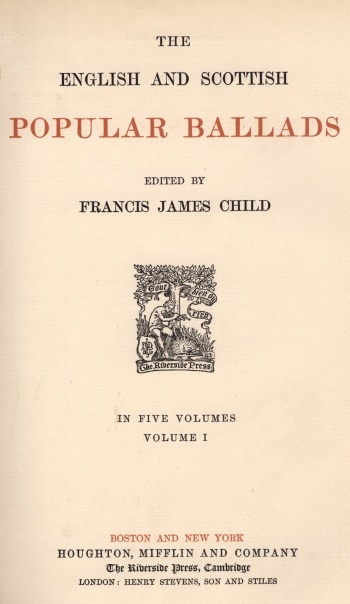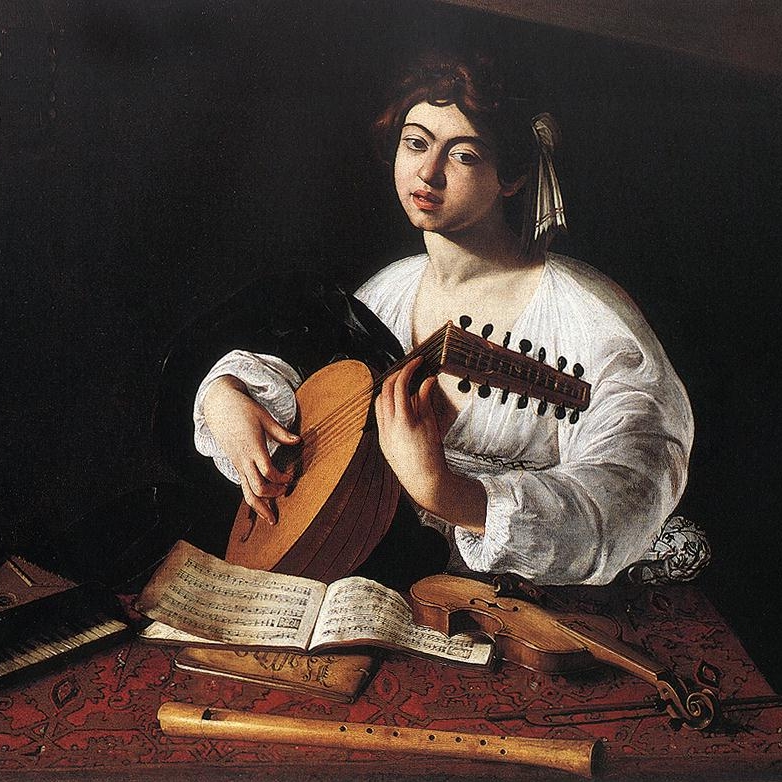In order to preserve the historical integrity of the ballads in this section they are presented in their original dialects, which span a broad range. These ballads have been passed down through the centuries from many different regions of Great Britain before appearing in print. A synopsis of each ballad, in modern American English, is provided to aid in ease of comprehension of the dialects.
When shawes been sheene, and shradds full fayre,
And leeves both large and longe,
Itt is merry, walking in the fayre forrest,
To heare the small birds songe.
The woodweele sang, and wold not cease,
Amongst the leaves a lyne:
And it is by two wight yeomen,
By deare God, that I meane.
"Me thought they did mee beate and binde,
And tooke my bow mee froe;
If I bee Robin a-live in this lande,
I'le be wrocken on both them towe."
Sweavens are swift, master," quoth John,
"As the wind that blowes ore a hill;
For if itt be never soe lowde this night,
To-morrow it may be still."
"Buske yee, bowne yee, my merry men all,
For John shall goe with mee:
For I'le goe seek yond wight yeomen
In greenwood where the bee."
The cast on their gowne of greene,
A shooting gone are they,
Untill they came to the merry greenwood,
Where they had gladdest bee;
There were the ware of a wight yeoman,
His body leaned to a tree.
A sword and a dagger he wore by his side,
Had beene many a man bane,
And he was cladd in his capull-hyde,
Topp, and tayle, and mayne.
"Stand you still, master," quoth Litle John,
"Under this trusty tree,
And I will goe to yong wight yeomen,
To know his meaning trulye."
"A, John, by me thou setts noe store,
And that's a farley thinge;
How offt send I my men beffore,
And tarry my-selfe behinde?
It is noe cunning a knave to ken,
And a man but heare him speake;
And itt were not for bursting of my bowe,
John, I wold thy head breake."
But often words they breeden bale,
That parted Robin and John;
John is gone to Barnesdale,
The gates he knowes eche one.
And when hee came to Barnesdale,
Great heavinesse there hee hadd;
He found two of his fellowes
Were slaine both in a slade.
And Scarlett a foote flyinge was,
Over stockes and stone,
For the sheriffe with seven score men
Fast after him is gone.
"Yett one shoote I'le shoote", sayes Little John,
"With Crist his might and mayne;
I'le make yond fellow that flyes soe fast
To be both glad and faine."
John bent up a good viewe bow,
And fetteled him to shoote;
The bow was made of a tender boughe,
And fell downe to his foote.
"Woe worth thee, wicked wood," sayd Little John,
"That ere thou grew on a tree!
For this day thou art my bale,
My foote when thou shold bee!"
This shoote it was but looselye shott,
The arrowe flew in vaine,
And it mett one of the sheriffes men;
Good William a Trent was slaine.
It had beene better for William a Trent
To hange upon a gallowe
Then for to lye in the greenwoode,
There slaine with an arrowe.
And it is syd, when men be mett,
Six can doe more then three:
And they have tane Litle John,
And bound him fast to a tre.
"Thou shalt be drawen by dale and downe," quoth the sheriffe,
And hanged hye on a hill:
"But thou may fayle," quoth Litle John,
"If itt be Christs owne will."
Let us leave talking of Little John,
For hee is bound fast to a tree,
And talke of Guy and Robin Hood,
In the green woode where they bee.
How these two yeomen together they mett,
Under the leaves of lyne,
To see what merchandise they made
Even at that same time.
"Good morrow, good fellow," quoth Sir Guy:
"Good morrow, good fellow," quoth hee;
"Methinkes by this bow thou beares in thy hand,
A good archer thou seems to bee."
"I am wilfull of my way," quoth Sir Guye,
"And of my morning tyde:"
"I'le lead thee through the wood," quoth Robin,
"Good fellow, I'le be thy guide."
"I seeke an outlaw," quoth Sir Guye,
"Men call him Robin Hood;
I had rather meet with him upon a day
Then forty pound of golde."
"If you tow mett it wold be seene whether were better
Afore yee did part awaye;
Let us some other pastime find,
Good fellow, I thee pray.
"Let us some other masteryes make,
And wee will walke in the woods even;
Wee may chance meet with Robin Hoode
Att some unsett steven."
They cutt them downe the summer shroggs
Which grew both under a bryar,
And sett them three score rodd in twinn,
To shoote the prickes full neare.
"Leade on, good fellow," sayd Sir Guye,
"Lead on, I doe bidd thee:"
"Nay, by my faith," quoth Robin Hood,
"The leader thou shalt bee."
The first good shoot that Robin ledd
Did not shoote an inch the pricke froe;
Guy was an archer good enoughe,
But he cold neere shoote soe.
The second shoote Sir Guy shott,
He shotte within the garlande;
But Robin Hoode shott it better then hee,
For he clove the good pricke-wande.
"Gods blessing on thy heart!" sayes Guye,
"Goode fellow, they shooting is goode;
For an thy hart be as good as thy hands,
Thou were better then Robin Hood.
"Tell me thy name, good fellow," quoth Guy,
"Under the leaves of lyne:"
"Nay, by my faith," quoth good Robin,
"Till thou have told me thine."
"I dwell by dale and downe," quoth Guye,
"And I have done many a curst turne;
And he that calles me by my right name
Calles me Guye of good Gysborne."
"My dwelling is in the wood," sayes Robin;
"By thee I set right nought;
My name is Robin Hood of Barnesdale,
A fellow thou has long sought.
He that had neither beene a kithe nor kin,
Might have seene a full fayre sight,
To see how together these yeomen went,
With blades both browne and bright.
To have seene how these yeomen together fought,
Two howers of a summers day;
Itt was neither Guy nor Robin Hood
That fettled them to flye away.
Robin was rechles on a roote,
And stumbled at that tyde,
And Guy was quicke and nimble withall,
And hitt him ore the left side.
"Ah, deere Lady!" sayd Robin Hoode,
"Thou are both mother and may!
I thinke it was never mans destinye
To dye before his day."
Robin thought on Our Lady deere,
And soone leapt up againe,
And thus he came with an awkwarde stroke;
Good Sir Guy hee has slayne.
He tooke Sir Guys head by the hayre,
And sticked itt on his bowes end:
"Thous hast beene traytor all thy liffe,
Which thing must have an ende."
Robin pulled forth an Irish kniffe,
And nicked Sir Guy in the face,
That hee was never on a woman borne
Cold tell who Sir Guye was.
Saies, "Lye there, lye there, good Sir Guye,
And with me be not wrothe;
If thou have had the worse stroakes at my hand,
Thou shalt have the better cloathe."
Robin did off his gowne of greene,
Sir Guye hee did it throwe;
And hee put on that capull-hyde,
That cladd him toppe to toe.
"The bowe, the arrowes, and little horne,
And with me now I'le beare;
For now I will goe to Barnesdale,
To see how my men doe fare."
Robin sett Guyes horne to his mouth,
A lowd blast in it he did blow;
That beheard the sheriffe of Nottingham,
As he leaned under a lowe.
"Hearken! hearken!" sayd the sheriffe,
"I heard noe tydings but good;
For yonder I heare Sir Guyes horne blowe,
For he hath slaine Robin Hoode.
"For yonder I heare Sir Guyes horne blow,
Itt blowes soe well in tyde,
For yonder comes that wighty yeoman,
Cladd in his capulll-hyde.
Come hither, thou good Sir Guy,
Aske of me what thou wilt have:"
"I'le none of thy gold," sayes Robin Hood,
"Nor I'le none of it have."
"But now I have slaine the master," he sayde,
"Let me goe strike the knave;
This is all the reward I aske,
Nor noe other will I have."
"Thou art a madman," said the shiriffe,
"Thou sholdest have had a knights fee;
Seeing thy asking hath beene soe badd,
Well granted it shall be."
But Litle John heard his master speake,
Well he knew that was his steven;
"now shall I be loset," quoth Litle John,
"With Christs might in heaven."
But Robin hee hyed him towards Litle John,
Hee thought hee wold loose him believe;
The sheriffe and all his companye
Fast after him did drive.
"Stand abacke! stand abacke!" sayd Robin;
"Why draw you mee soe neere?
Itt was never the use in our countrye
One's shrift another shold heere."
But Robin pulled forth an Irysh kniffe,
And losed John hand and foote,
And gave him Sir Guyes bow in his hand,
And bade it be his boote.
But John tooke Guyes bow in his hand -
His arrowes were rawstye by the roote -
The sheriffe saw Litle John draw a bow
And fettle him to shoote.
Towards his house in Nottingham
He fled full fast away,
And soe did all his companye,
Not one behind did stay.
But he cold neither soe fast goe,
Nor away soe fast runn,
But Litle John, with an arrow broade,
Did cleave his heart in twinn.
The ballad Robin Hood and Guy of Gisborne appears in Volume III of The English and Scottish Popular Ballads, edited by Francis James Child. These volumes are in the public domain.

The Child Ballads are 305 traditional ballads from England and Scotland, and their American variants, anthologized by Francis James Child during the second half of the 19th century. ... Read more at Wikipedia.

Ballads were particularly characteristic of the popular poetry and song of the British Isles from the later medieval period until the 19th century. ... Read more at Wikipedia.